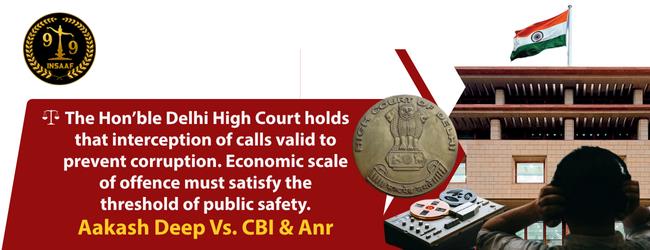2025-Jul-11

The Hon’ble Delhi High Court holds that interception of calls valid to prevent corruption. Economic scale of offence must satisfy the threshold of public safety.
The Hon’ble Delhi High Court has rejected a plea filed by an accused against interception of calls and messages by Central Bureau of Investigation (CBI). The Hon’ble Delhi High Court has dismissed the plea moved by the accused challenging a trial court order framing charges against him under Section 120B of the Indian Penal Code, 1860, read with Section 9 of the Prevention of Corruption Act, 1988. He further sought directions for expunging or destruction of telephonic messages and calls allegedly unlawfully intercepted by the CBI.
The CBI had alleged that the accused persons entered into a conspiracy for securing a sub-contract for steel work from M/s. Shapoorji Pallonji and Co. (P) Ltd. in favour of M/s. Capacite Structures Limited in the project awarded to it by M/s. NBCC Ltd. The CBI alleged that one of the accused a public servant had demanded a new motorcycle as illegal gratification to exercise his influence with senior functionaries of M/s. NBCC Ltd. The said demand was conveyed by another accused, acting as a middleman to facilitate the transaction, to the accused who is the MD of M/s. Capacite Structures Limited.
It was the accused’s case that the interceptions were unlawfully and illegally carried out by CBI in violation of his fundamental rights and statutory safeguards and accordingly, the same were inadmissible as evidence. It was also submitted that the material brought forth by CBI after investigation, including the calls, did not make out a case of grave suspicion.
Rejecting the plea, the Court observed that although every person has a fundamental right to privacy, the said right is not absolute and it can be curtailed by procedure established by law. It added that the Central Government or a State Government or any officer specially authorised is empowered to legally carry out interception or surveillance in the event of any public emergency or in the interest of public safety.
The High Court Further observed that:
“Corruption has a pervasive impact on a nation's economy and the same can impact anything from infrastructural development to resource allocation. Corruption by a public servant has far reaching consequences as it serves to not only erode public trust and cast aspersions on the integrity of public institutions, but also renders the public at large susceptible and vulnerable by threatening the economic safety of the country.”
The Hon’ble High Court further observed that the allegations in the case were grave in nature and, if proven, would render dubious the entire process of awarding of tenders and bids on the basis of personal influence with senior officers rather than benefit of the public at large. “The economic scale of the offence, in the opinion of this Court, satisfies the threshold of “public safety”,” the Court said.
“In view of the above, this Court is of the opinion that the interception was carried out in accordance with law, and therefore, no case is made out for destruction of the transcripts,” the Court said.
What can the Legal Experts do for you? Our team of lawyers is ready to help you in minutes with any legal question.
 Whatsapp
Whatsapp
 Toll Free :-
1800-212-9001
Toll Free :-
1800-212-9001